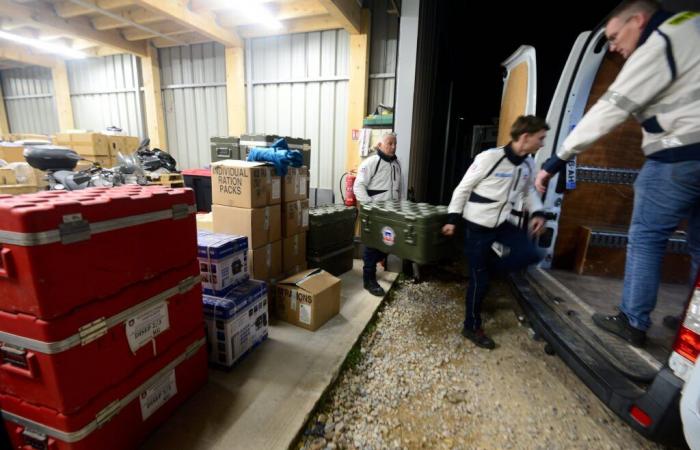
« NWe meet with the other team volunteers at noon on Friday to be able to drop off the equipment, which leaves by civilian freight on Sunday.explains Loïc Bargibant, team leader of the White Cross based in Arcs-sur-Argens, Thursday.
That evening the volunteers loaded hundreds of kilos of equipment with a view to reaching Paris and Charles-de-Gaulle airport in Roissy. They will then be deployed to Mayotte to help the island's inhabitants, affected by cyclone Chido in mid-December, then storm Dikeledi on January 13.
Protean actions
“We are ten White Cross volunteers fromhe specifies. Saturday, we take off at 1:45 p.m. for Reunion, then we will be deployed to Mayotte, with the equipment, as soon as the airlift allows it. »
Alongside Loïc Bargibant, Pascal Mondello, 67, a volunteer for two years, is also there. “This is my first mission to help the population a long distance from homehe smiled without the slightest worry. We are trained and then my career as a firefighter allows me to know how to manage pressure and tense situations. »
As for their role there, the situation was still unclear, even before their departure. “Chido swept away everything, the storm flooded many areasreports Loïc Bargibant. We are equipped for several types of missions. Coming home from work, I finally had the town we were going to work on when we arrived. This is Bandrélé, in Grande Terre. Agents equipped with vehicles will take us to areas. »
This is why volunteers bring a lot of equipment. “34 packages for a total weight of 838 kghe counts. We are leaving in total autonomy for two weeks with rations, sleeping tents, showers and chemical toilets. We ensure our own needs so as not to be an additional burden, as part of the assistance to be provided to the victims. »
And also something to act on. “We have all the necessary equipment to cover roofs, do cross-cutting, pruning, clear roads or river beds of waste that has been carried away by bad weather”continues the team leader. The highlight of all the equipment is a water purification kit, distributed in three trunks.
-“We can have the device operational in an hourexplains Loïc Bargibant. Once running, it can produce 1,500 liters per hour, and even make drinking water from sludge. »
The rescuer already has a strategy in mind. “The idea is to settle down in one place, to allow the Mahorais to resupply and fill tanks or other reserves, then to change sector to allow other inhabitants to have drinking water again . »
Among the elements, there are also new generators “who will remain on site once the operations are completed. »
Call for donations
The ten rescuers from the operation should return to mainland France after two weeks of action. “The White Cross federation will take stock of whether a replacement is put in place for two more weeks or not”he concludes.
A prize pool has been set up by the White Cross to finance the actions of volunteers in Mayotte.


